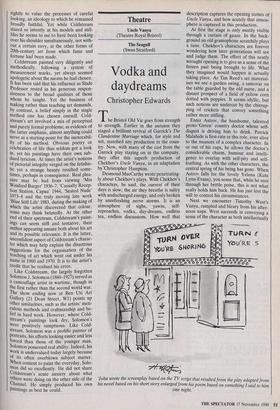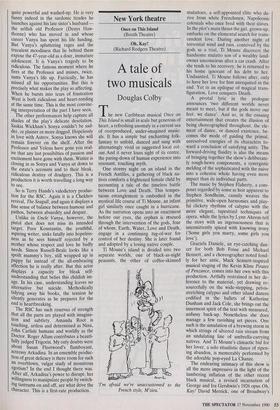Theatre
Uncle Vanya (Theatre Royal Bristol) The Seagull (Swan Stratford)
Vodka and daydreams
Christopher Edwards
The Bristol Old Vic goes from strength to strength. Earlier in the autumn they staged a brilliant revival of Garrick's The Clandestine Marriage which, for style and wit, matched any production in the coun- try. Now, with many of the cast from the Garrick play staying on in the company, they offer this superb production of Chekhov's Uncle Vanya, in an adaptation by 'Christopher Hampton.
Desmond MacCarthy wrote penetrating- ly about Chekhov's plays. With Chekhov's characters, he said, the current of their days is slow; the air they breathe is sultry with undischarged energy, and only broken by unrefreshing nerve storms. It is an atmosphere of sighs, yawns, self- reproaches, vodka, day-dreams, endless tea, endless discussions. How well that description captures the opening scenes of Uncle Vanya, and how acutely that atmos- phere is captured in this production.
At first the stage is only mistily visible through a curtain of gauze. In the back- ground an old gramophone scratchily plays a tune. Chekhov's characters are forever wondering how later generations will see and judge them. The effect of this neatly wrought opening is to give us a sense of the frozen past being brought to life. What they imagined would happen is actually taking place. As Tim Reed's set material- ises we see a garden swing, a samovar on the table guarded by the old nurse, and a distant prospect of a field of yellow corn dotted with poppies. It seems idyllic, but such notions are undercut by the chirrup- ping of crickets that convey something rather more stifling.
Enter Astrov, the handsome, talented proto-'Green' country doctor whose self- disgust is driving him to drink. Patrick Malahide is first-rate in this role, ever alive to the nuances of a complex character. In or out of his cups, he allows the doctor's considerable charm, humour and intelli- gence to overlap with self-pity and self- loathing. As with the other characters, the central spring of his being has gone. When Astrov falls for the lovely Yelena (Kate Lynn-Evans), you sense that, while he sees 'through her brittle poise, this is not what really holds him back. He has just lost the will to control his circumstances.
Next we encounter Timothy West's Vanya, rumpled and bleary from his after- noon naps. West succeeds in conveying a sense of the character as both intellectually `John wrote the screenplay based on the TV script that resulted from the play adapted from his novel based on his short story enlarged from his poem based on something I said to him one night.' quite powerful and washed-up. He is very funny indeed in the sardonic tirades he launches against his late sister's husband the selfish old Professor (Denys Haw- thorne) who has moved in and whose career Vanya has spent his life funding. But Vanya's spluttering rages and the truculent moodiness that lie behind them expose the 47-year-old as a dour, immature adolescent. It is Vanya's tragedy to be ridiculous. The famous moment where he fires at the Professor and misses, twice, sums Vanya's life up. Farcically, he has missed all his opportunities. But this is precisely what makes the play so affecting. When he bursts into tears of frustration West is both ridiculous and heart-rending at the same time. This is the most convinc- ing interpretation of the part I have seen. The other performances help capture all shades of the play's delicate desolation. Saskia Wickham's Sonya couldn't be sad- der, or plainer or more dogged. Hopelessly in love with Astrov, Sonya knows she will remain forever on the shelf. After the Professor and Yelena have gone you real- ise that any last possibilties of passion and excitement have gone with them. Winter is closing in as Sonya and Vanya sit down to the estate's accounts and to their bleak, ridiculous destiny of drudgery. This is a production it is worth travelling a long way to see.
So is Terry Hands's valedictory produc- tion for the RSC. Again it is a Chekhov revival, The Seagull, and again it displays a fine sense of balance between humour and pathos, between absurdity and despair. Unlike in Uncle Vanya, however, the pistol shot does not miss its intended target. Poor Konstantin, the youthful, aspiring writer, sinks fatally into hopeless- ness as he sees himself rejected by a mother whose respect and love he badly needs. Simon Russell-Beale looks like a spoilt mummy's boy, still wrapped up in puppy fat instead of the all-embracing affection he is really after. But this actor displays a capacity for bleak self- understanding that belies this childish im- age. In his case, understanding leaves no alternative but suicide. Methodically tidying away his books, the tension he silently generates as he prepares for the end is heartbreaking.
The RSC has such reserves of strength that all the parts are played with imagina- tion and subtlety. Amanda Root is touching, artless and determined as Nina, John Carlisle humane and worldly as the Doctor. Roger Allam contributes a beauti- fully judged Trigorin. My only doubts were about Susan Fleetwood's flamboyant, actressy Arkadina. In an ensemble produc- tion of great delicacy is there room for such an overblown, vulgar study of monstrous egotism? In the end I thought there was. After all, Arkadina's power to disrupt, her willingness to manipulate people by switch- ing tantrums on and off, are what drive the character. This is a first-rate production.
























































 Previous page
Previous page